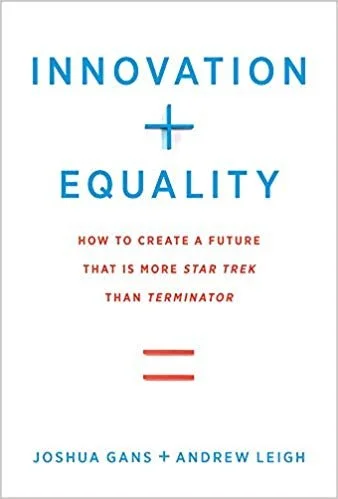Innovation + Equality
Creating a Future that is more Star Trek than Terminator
Is economic inequality the price we pay for innovation? The amazing technological advances of the last two decades—in such areas as artificial intelligence, genetics, and materials—have benefited society collectively and rewarded innovators handsomely: we get cool smartphones and technology moguls become billionaires. This contributes to a growing wealth gap; in the United States; the wealth controlled by the top 0.1 percent of households equals that of the bottom ninety percent. Is this the inevitable cost of an innovation-driven economy? Economist Joshua Gans and policy maker Andrew Leigh make the case that pursuing innovation does not mean giving up on equality—precisely the opposite. In this book, they outline ways that society can become both more entrepreneurial and more egalitarian.
All innovation entails uncertainty; there's no way to predict which new technologies will catch on. Therefore, Gans and Leigh argue, rather than betting on the future of particular professions, we should consider policies that embrace uncertainty and protect people from unfavorable outcomes. To this end, they suggest policies that promote both innovation and equality. If we encourage innovation in the right way, our future can look more like the cheerful techno-utopia of Star Trek than the dark techno-dystopia of The Terminator.
ENDORSEMENTS
“Fostering innovation and reducing inequality are the two fundamental challenges of modern economies. This important book offers both crucial insights and practical policy suggestions. It is a must-read for economists, policymakers, and voters.”
-Christina Romer, UC Berkeley, Former Chair of Council of Economic Advisors
“While there’s no economic law that innovation will benefit the many, not just the few, Gans and Leigh provide a clear, cogent blueprint for a future of widely shared prosperity. Every policymaker and citizen should read it.”
-Erik Brynjolfsson, MIT, co-author of The Second Machine Age
“The central virtue of a market economy is its capacity to innovate. But today inequality is creating divisions that endanger our future. Some claim that these inequalities are the inevitable consequence of an innovative society. Gans and Leigh debunk that theory. Their exciting book shows us that it really is possible to shape a society in which we have more innovation AND more equality.
- Joseph Stiglitz, Columbia, Nobel laureate, Former Chair of Council of Economic Advisors
“Is inequality really the price we have to pay for innovation? In this hugely enjoyable book Gans and Leigh make a strong case for believing that we don’t have to make this tradeoff – that we can have both a bigger cake and a more equitable division of the slices. This one of the central problems of our time, and the book is hugely convincing and beautifully written. Buy it!”
- Rebecca Henderson, Harvard
“We have been told that great innovation naturally leads to great inequality, a winner-take all economy. We are then presented with a dilemma, innovation or equality? In Innovation+Equality, Joshua Gans and Andrew Leigh draw on their wealth of experience in politics, economics and venture capital to transcend this dilemma and show that we can have technological innovation and greater equality, an all-win economy. Bravo!”
- Alex Tabarrok, George Mason
MEDIA
“Innovation and Equality,” The Economic Review, 9 September 2020.
“The risk and rewards from innovation,” The Australian, 15 May 2020.
“Does innovation mean more inequality,” The Science Show, 22 February 2020.
“Innovation + Equality,” Economics Explained Podcast, 29 January 2020.
“Review,” Sydney Morning Herald, 28 January 2020.
“The Return of American Entrepreneurship,” Real Clear Public Affairs, 14 January 2020.
“Innovation + Equality ft. Joshua Gans,” Ne0liberal Podcast, 8 January 2020.
“The year’s best books on the economy we live in,” Technology Review, 23 December 2019.
“In a breezily written new book, Andrew Leigh and Joshua Gans ask whether innovation and equality can co-exist,” Canberra Times, 7 December 2019.
“Technology won’t make everyone a billionaire but it shouldn’t making them poorer, either,” Startup Daily, 3 December 2019.
“Humanity’s paths: A “Star Trek” utopia or a “Terminator” dsytopia?” Salon, 1 December 2019.
“More Star Trek than Terminator,” Inside Story, 25 November 2019.
“Labour’s Lost Share of the Cake,” Newsport, 23 November 2019.
“Andrew Leigh: Innovation + Equality,” Policy Forum, 22 November 2019.
“Interview with Andrew Leigh,” 2GB Radio, 21 November 2019.
“Why the innovation revolution risks government letting inequality rip,” The Guardian, 20 November 2019.
“Interview with Andrew Leigh,” Innovation Talks, 19 November 2019.
“Inequality isn’t the price of progress,” Sky News Australia, 19 November 2019.
“Creating a future that is more Star Trek than Terminator,” Ameer Approved Podcast, 18 November 2019.
“35 Best new Technology Books to read in 2020,” Book Authority, 18 November 2019.
“Canada should take an insurance approach to future disruption,” Policy Options, 15 November 2019.
“Equity can be the mother of invention,” Sydney Morning Herald, 12 November 2019.
The Economist, “The value of freeing ideas, not just locking them up” 8 November 2019.
Association of MBAs, “Is inequality the price of progress?” 7 November 2019.
IEDP Developing Leaders, “Review of Innovation + Equality” 5 November 2019.
“Running out of excuses for high inequality” The Hill, 27 October 2019.
Joshua Gans is Professor of Strategic Management and holds the Jeffrey S. Skoll Chair of Technical Innovation and Entrepreneurship at the University of Toronto's Rotman School of Management. He is the author of The Disruption Dilemma (MIT Press), Prediction Machines, and other books.
Andrew Leigh is a former economics professor and current Member of the House of Representatives in Australia. He is the author of Disconnected, Randomistas and other books.


